Organisational Behaviour Report: Primark and Motivational Theories
VerifiedAdded on 2023/01/13
|15
|5121
|1
Report
AI Summary
This report provides a comprehensive analysis of organisational behaviour, using Primark as a case study. It explores the effects of culture, power, and politics on individual and team actions, examining various cultural dimensions and their impact. The report delves into motivational theories, including content and process theories like Maslow's hierarchy and Adams' equity theory, to understand how to influence individuals and teams to achieve goals. It further differentiates between effective and ineffective teams, highlighting the importance of soft skills for managers and teams. The report also discusses the application of organisational behaviour concepts within the context of Primark, offering insights into leadership, team dynamics, and employee motivation to enhance overall organisational performance.
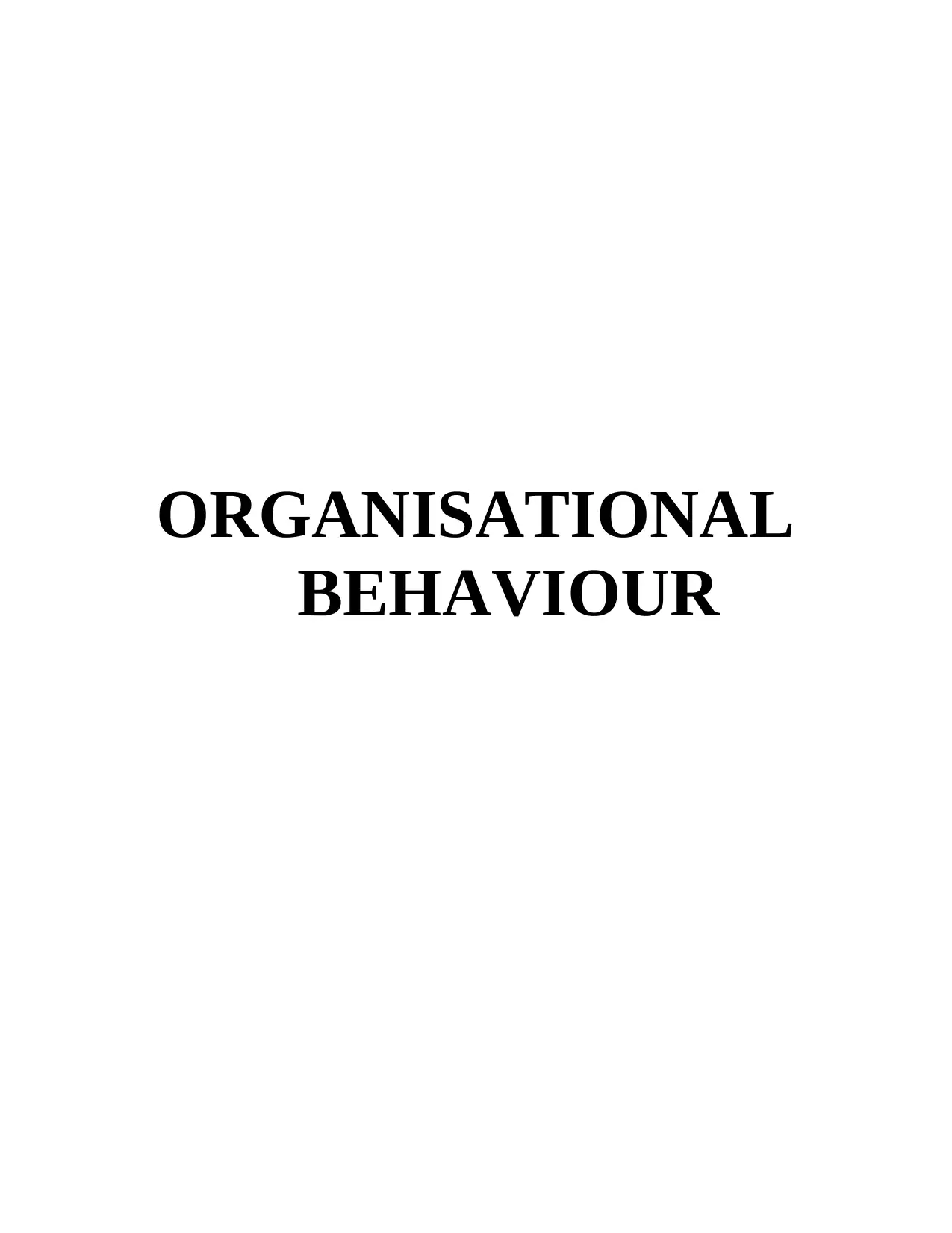
ORGANISATIONAL
BEHAVIOUR
BEHAVIOUR
Paraphrase This Document
Need a fresh take? Get an instant paraphrase of this document with our AI Paraphraser
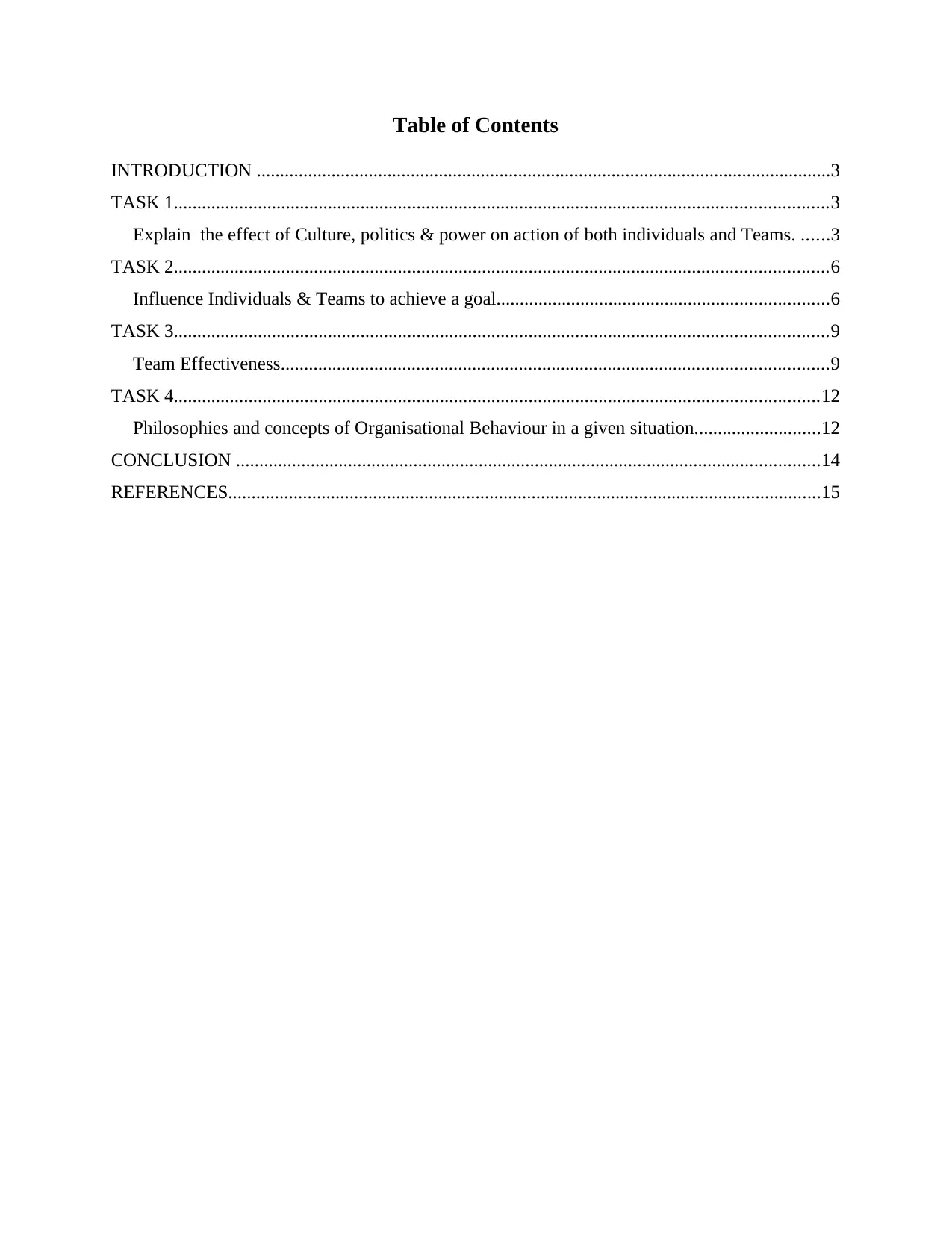
Table of Contents
INTRODUCTION ...........................................................................................................................3
TASK 1............................................................................................................................................3
Explain the effect of Culture, politics & power on action of both individuals and Teams. ......3
TASK 2............................................................................................................................................6
Influence Individuals & Teams to achieve a goal.......................................................................6
TASK 3............................................................................................................................................9
Team Effectiveness.....................................................................................................................9
TASK 4..........................................................................................................................................12
Philosophies and concepts of Organisational Behaviour in a given situation...........................12
CONCLUSION .............................................................................................................................14
REFERENCES...............................................................................................................................15
INTRODUCTION ...........................................................................................................................3
TASK 1............................................................................................................................................3
Explain the effect of Culture, politics & power on action of both individuals and Teams. ......3
TASK 2............................................................................................................................................6
Influence Individuals & Teams to achieve a goal.......................................................................6
TASK 3............................................................................................................................................9
Team Effectiveness.....................................................................................................................9
TASK 4..........................................................................................................................................12
Philosophies and concepts of Organisational Behaviour in a given situation...........................12
CONCLUSION .............................................................................................................................14
REFERENCES...............................................................................................................................15
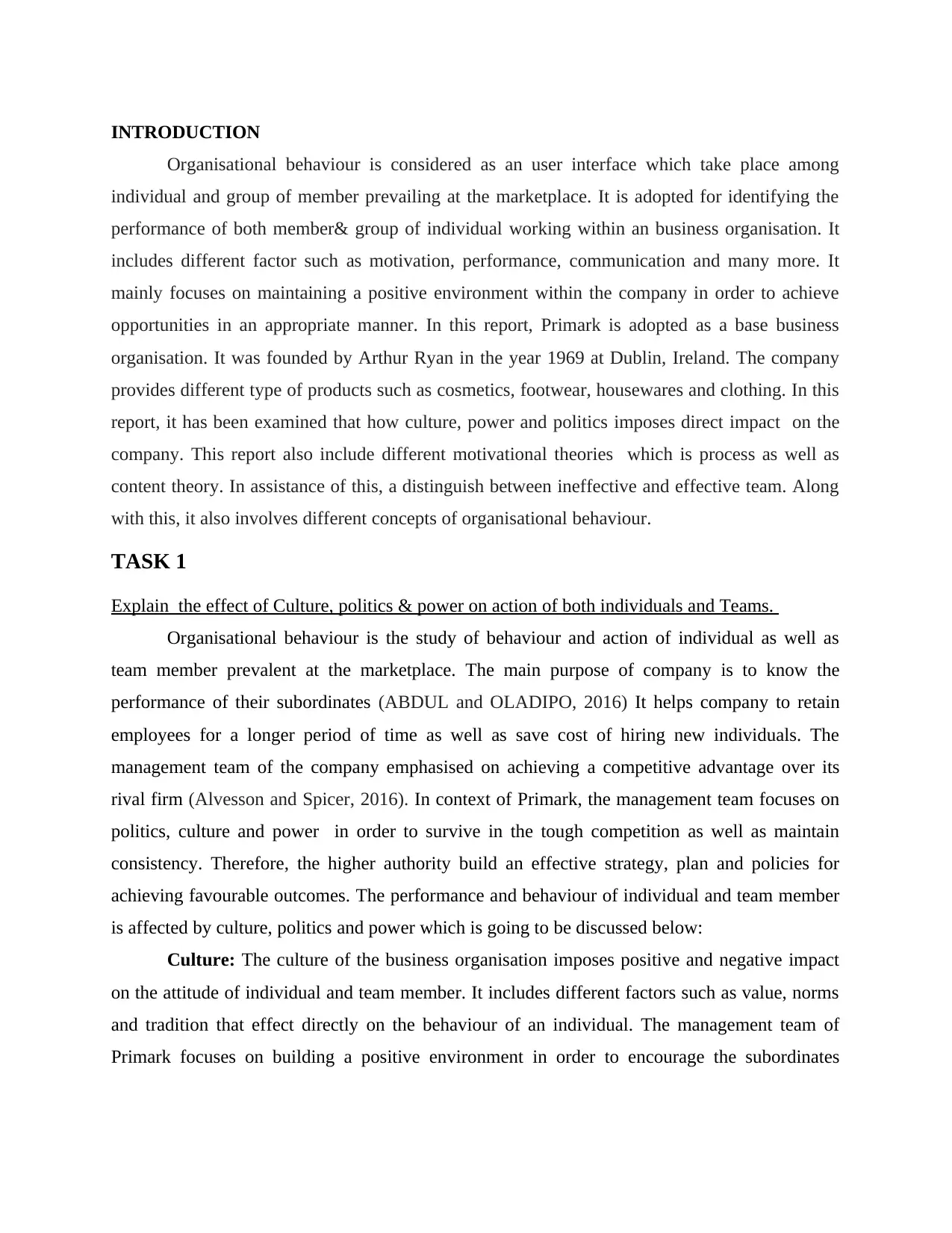
INTRODUCTION
Organisational behaviour is considered as an user interface which take place among
individual and group of member prevailing at the marketplace. It is adopted for identifying the
performance of both member& group of individual working within an business organisation. It
includes different factor such as motivation, performance, communication and many more. It
mainly focuses on maintaining a positive environment within the company in order to achieve
opportunities in an appropriate manner. In this report, Primark is adopted as a base business
organisation. It was founded by Arthur Ryan in the year 1969 at Dublin, Ireland. The company
provides different type of products such as cosmetics, footwear, housewares and clothing. In this
report, it has been examined that how culture, power and politics imposes direct impact on the
company. This report also include different motivational theories which is process as well as
content theory. In assistance of this, a distinguish between ineffective and effective team. Along
with this, it also involves different concepts of organisational behaviour.
TASK 1
Explain the effect of Culture, politics & power on action of both individuals and Teams.
Organisational behaviour is the study of behaviour and action of individual as well as
team member prevalent at the marketplace. The main purpose of company is to know the
performance of their subordinates (ABDUL and OLADIPO, 2016) It helps company to retain
employees for a longer period of time as well as save cost of hiring new individuals. The
management team of the company emphasised on achieving a competitive advantage over its
rival firm (Alvesson and Spicer, 2016). In context of Primark, the management team focuses on
politics, culture and power in order to survive in the tough competition as well as maintain
consistency. Therefore, the higher authority build an effective strategy, plan and policies for
achieving favourable outcomes. The performance and behaviour of individual and team member
is affected by culture, politics and power which is going to be discussed below:
Culture: The culture of the business organisation imposes positive and negative impact
on the attitude of individual and team member. It includes different factors such as value, norms
and tradition that effect directly on the behaviour of an individual. The management team of
Primark focuses on building a positive environment in order to encourage the subordinates
Organisational behaviour is considered as an user interface which take place among
individual and group of member prevailing at the marketplace. It is adopted for identifying the
performance of both member& group of individual working within an business organisation. It
includes different factor such as motivation, performance, communication and many more. It
mainly focuses on maintaining a positive environment within the company in order to achieve
opportunities in an appropriate manner. In this report, Primark is adopted as a base business
organisation. It was founded by Arthur Ryan in the year 1969 at Dublin, Ireland. The company
provides different type of products such as cosmetics, footwear, housewares and clothing. In this
report, it has been examined that how culture, power and politics imposes direct impact on the
company. This report also include different motivational theories which is process as well as
content theory. In assistance of this, a distinguish between ineffective and effective team. Along
with this, it also involves different concepts of organisational behaviour.
TASK 1
Explain the effect of Culture, politics & power on action of both individuals and Teams.
Organisational behaviour is the study of behaviour and action of individual as well as
team member prevalent at the marketplace. The main purpose of company is to know the
performance of their subordinates (ABDUL and OLADIPO, 2016) It helps company to retain
employees for a longer period of time as well as save cost of hiring new individuals. The
management team of the company emphasised on achieving a competitive advantage over its
rival firm (Alvesson and Spicer, 2016). In context of Primark, the management team focuses on
politics, culture and power in order to survive in the tough competition as well as maintain
consistency. Therefore, the higher authority build an effective strategy, plan and policies for
achieving favourable outcomes. The performance and behaviour of individual and team member
is affected by culture, politics and power which is going to be discussed below:
Culture: The culture of the business organisation imposes positive and negative impact
on the attitude of individual and team member. It includes different factors such as value, norms
and tradition that effect directly on the behaviour of an individual. The management team of
Primark focuses on building a positive environment in order to encourage the subordinates
⊘ This is a preview!⊘
Do you want full access?
Subscribe today to unlock all pages.

Trusted by 1+ million students worldwide
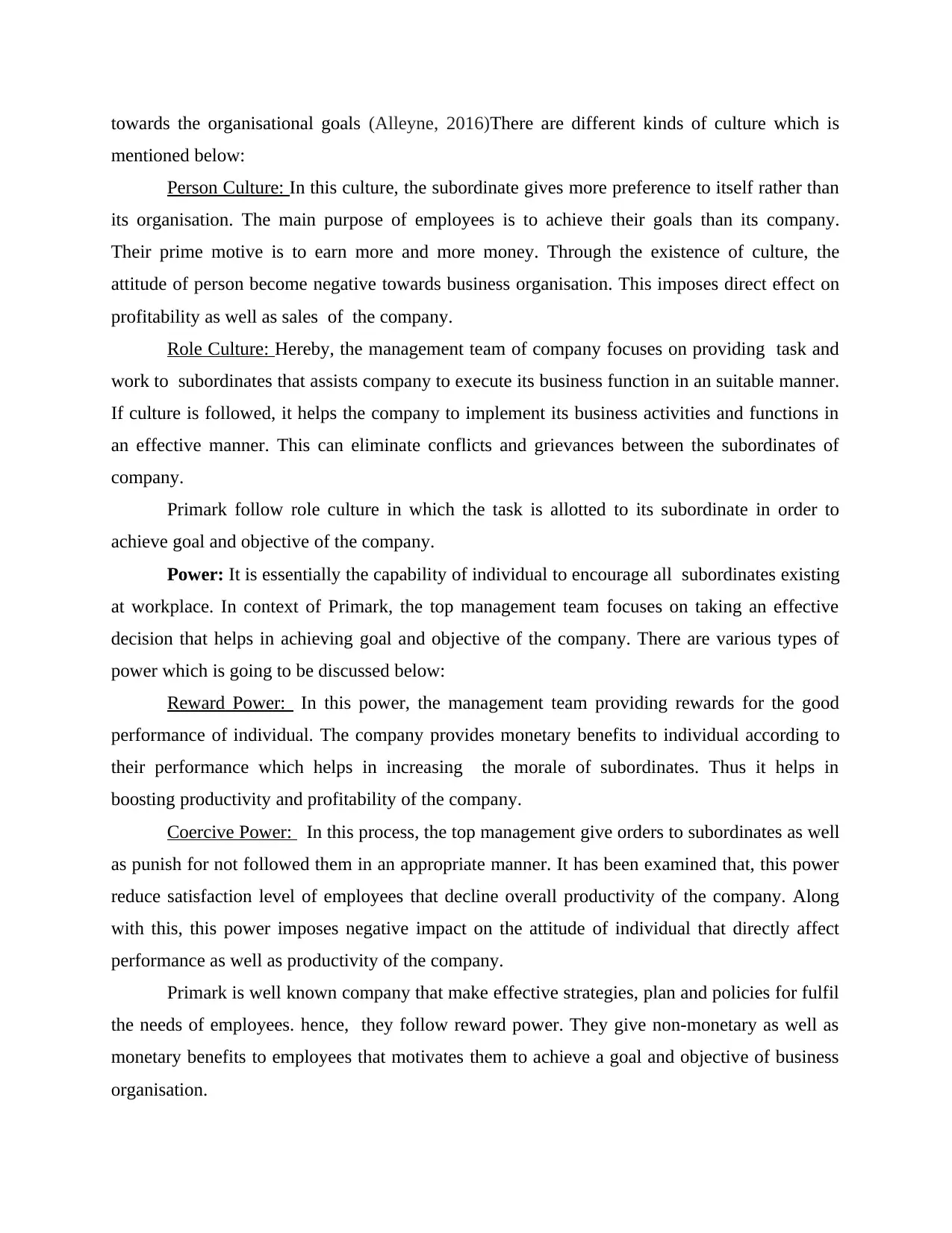
towards the organisational goals (Alleyne, 2016)There are different kinds of culture which is
mentioned below:
Person Culture: In this culture, the subordinate gives more preference to itself rather than
its organisation. The main purpose of employees is to achieve their goals than its company.
Their prime motive is to earn more and more money. Through the existence of culture, the
attitude of person become negative towards business organisation. This imposes direct effect on
profitability as well as sales of the company.
Role Culture: Hereby, the management team of company focuses on providing task and
work to subordinates that assists company to execute its business function in an suitable manner.
If culture is followed, it helps the company to implement its business activities and functions in
an effective manner. This can eliminate conflicts and grievances between the subordinates of
company.
Primark follow role culture in which the task is allotted to its subordinate in order to
achieve goal and objective of the company.
Power: It is essentially the capability of individual to encourage all subordinates existing
at workplace. In context of Primark, the top management team focuses on taking an effective
decision that helps in achieving goal and objective of the company. There are various types of
power which is going to be discussed below:
Reward Power: In this power, the management team providing rewards for the good
performance of individual. The company provides monetary benefits to individual according to
their performance which helps in increasing the morale of subordinates. Thus it helps in
boosting productivity and profitability of the company.
Coercive Power: In this process, the top management give orders to subordinates as well
as punish for not followed them in an appropriate manner. It has been examined that, this power
reduce satisfaction level of employees that decline overall productivity of the company. Along
with this, this power imposes negative impact on the attitude of individual that directly affect
performance as well as productivity of the company.
Primark is well known company that make effective strategies, plan and policies for fulfil
the needs of employees. hence, they follow reward power. They give non-monetary as well as
monetary benefits to employees that motivates them to achieve a goal and objective of business
organisation.
mentioned below:
Person Culture: In this culture, the subordinate gives more preference to itself rather than
its organisation. The main purpose of employees is to achieve their goals than its company.
Their prime motive is to earn more and more money. Through the existence of culture, the
attitude of person become negative towards business organisation. This imposes direct effect on
profitability as well as sales of the company.
Role Culture: Hereby, the management team of company focuses on providing task and
work to subordinates that assists company to execute its business function in an suitable manner.
If culture is followed, it helps the company to implement its business activities and functions in
an effective manner. This can eliminate conflicts and grievances between the subordinates of
company.
Primark follow role culture in which the task is allotted to its subordinate in order to
achieve goal and objective of the company.
Power: It is essentially the capability of individual to encourage all subordinates existing
at workplace. In context of Primark, the top management team focuses on taking an effective
decision that helps in achieving goal and objective of the company. There are various types of
power which is going to be discussed below:
Reward Power: In this power, the management team providing rewards for the good
performance of individual. The company provides monetary benefits to individual according to
their performance which helps in increasing the morale of subordinates. Thus it helps in
boosting productivity and profitability of the company.
Coercive Power: In this process, the top management give orders to subordinates as well
as punish for not followed them in an appropriate manner. It has been examined that, this power
reduce satisfaction level of employees that decline overall productivity of the company. Along
with this, this power imposes negative impact on the attitude of individual that directly affect
performance as well as productivity of the company.
Primark is well known company that make effective strategies, plan and policies for fulfil
the needs of employees. hence, they follow reward power. They give non-monetary as well as
monetary benefits to employees that motivates them to achieve a goal and objective of business
organisation.
Paraphrase This Document
Need a fresh take? Get an instant paraphrase of this document with our AI Paraphraser
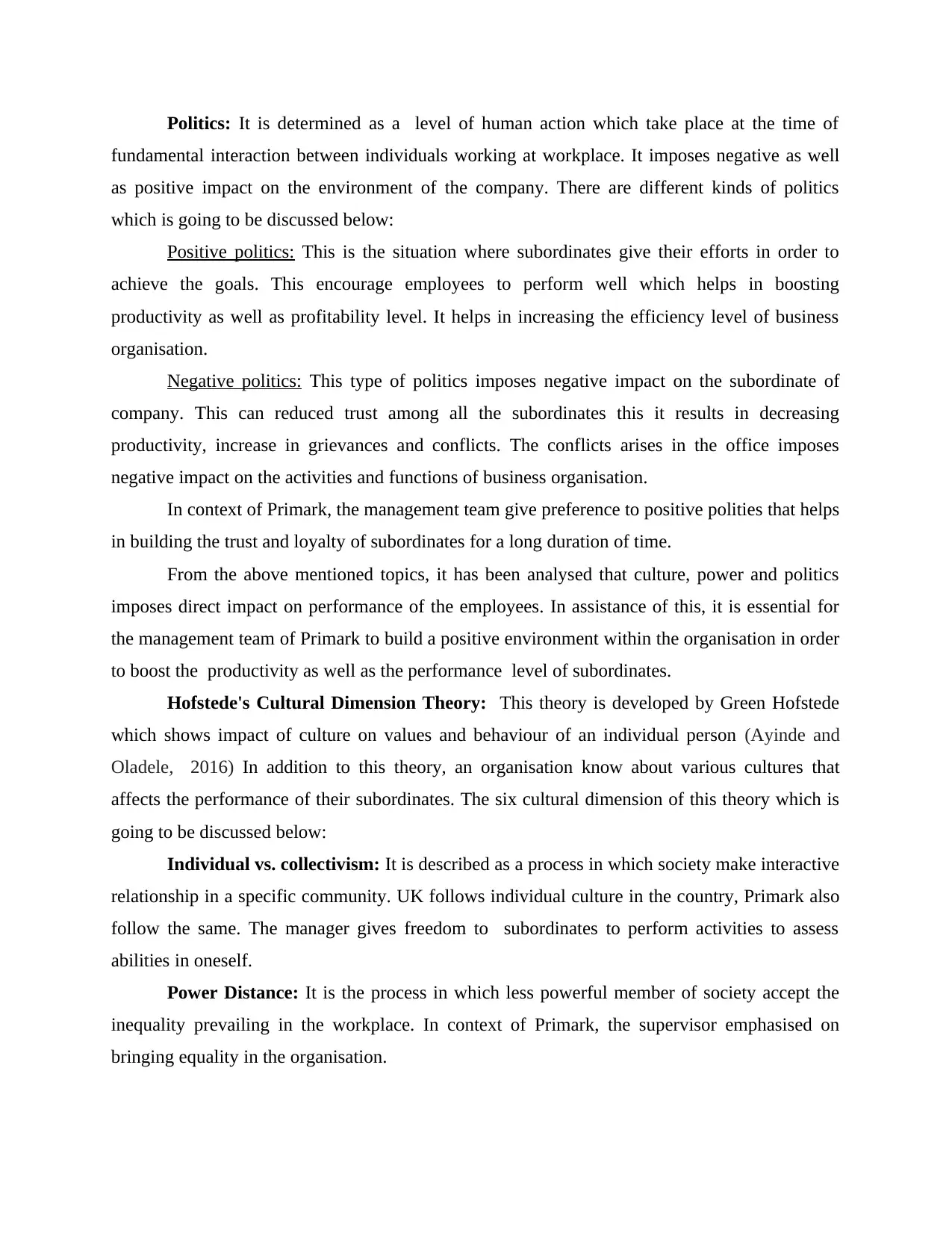
Politics: It is determined as a level of human action which take place at the time of
fundamental interaction between individuals working at workplace. It imposes negative as well
as positive impact on the environment of the company. There are different kinds of politics
which is going to be discussed below:
Positive politics: This is the situation where subordinates give their efforts in order to
achieve the goals. This encourage employees to perform well which helps in boosting
productivity as well as profitability level. It helps in increasing the efficiency level of business
organisation.
Negative politics: This type of politics imposes negative impact on the subordinate of
company. This can reduced trust among all the subordinates this it results in decreasing
productivity, increase in grievances and conflicts. The conflicts arises in the office imposes
negative impact on the activities and functions of business organisation.
In context of Primark, the management team give preference to positive polities that helps
in building the trust and loyalty of subordinates for a long duration of time.
From the above mentioned topics, it has been analysed that culture, power and politics
imposes direct impact on performance of the employees. In assistance of this, it is essential for
the management team of Primark to build a positive environment within the organisation in order
to boost the productivity as well as the performance level of subordinates.
Hofstede's Cultural Dimension Theory: This theory is developed by Green Hofstede
which shows impact of culture on values and behaviour of an individual person (Ayinde and
Oladele, 2016) In addition to this theory, an organisation know about various cultures that
affects the performance of their subordinates. The six cultural dimension of this theory which is
going to be discussed below:
Individual vs. collectivism: It is described as a process in which society make interactive
relationship in a specific community. UK follows individual culture in the country, Primark also
follow the same. The manager gives freedom to subordinates to perform activities to assess
abilities in oneself.
Power Distance: It is the process in which less powerful member of society accept the
inequality prevailing in the workplace. In context of Primark, the supervisor emphasised on
bringing equality in the organisation.
fundamental interaction between individuals working at workplace. It imposes negative as well
as positive impact on the environment of the company. There are different kinds of politics
which is going to be discussed below:
Positive politics: This is the situation where subordinates give their efforts in order to
achieve the goals. This encourage employees to perform well which helps in boosting
productivity as well as profitability level. It helps in increasing the efficiency level of business
organisation.
Negative politics: This type of politics imposes negative impact on the subordinate of
company. This can reduced trust among all the subordinates this it results in decreasing
productivity, increase in grievances and conflicts. The conflicts arises in the office imposes
negative impact on the activities and functions of business organisation.
In context of Primark, the management team give preference to positive polities that helps
in building the trust and loyalty of subordinates for a long duration of time.
From the above mentioned topics, it has been analysed that culture, power and politics
imposes direct impact on performance of the employees. In assistance of this, it is essential for
the management team of Primark to build a positive environment within the organisation in order
to boost the productivity as well as the performance level of subordinates.
Hofstede's Cultural Dimension Theory: This theory is developed by Green Hofstede
which shows impact of culture on values and behaviour of an individual person (Ayinde and
Oladele, 2016) In addition to this theory, an organisation know about various cultures that
affects the performance of their subordinates. The six cultural dimension of this theory which is
going to be discussed below:
Individual vs. collectivism: It is described as a process in which society make interactive
relationship in a specific community. UK follows individual culture in the country, Primark also
follow the same. The manager gives freedom to subordinates to perform activities to assess
abilities in oneself.
Power Distance: It is the process in which less powerful member of society accept the
inequality prevailing in the workplace. In context of Primark, the supervisor emphasised on
bringing equality in the organisation.
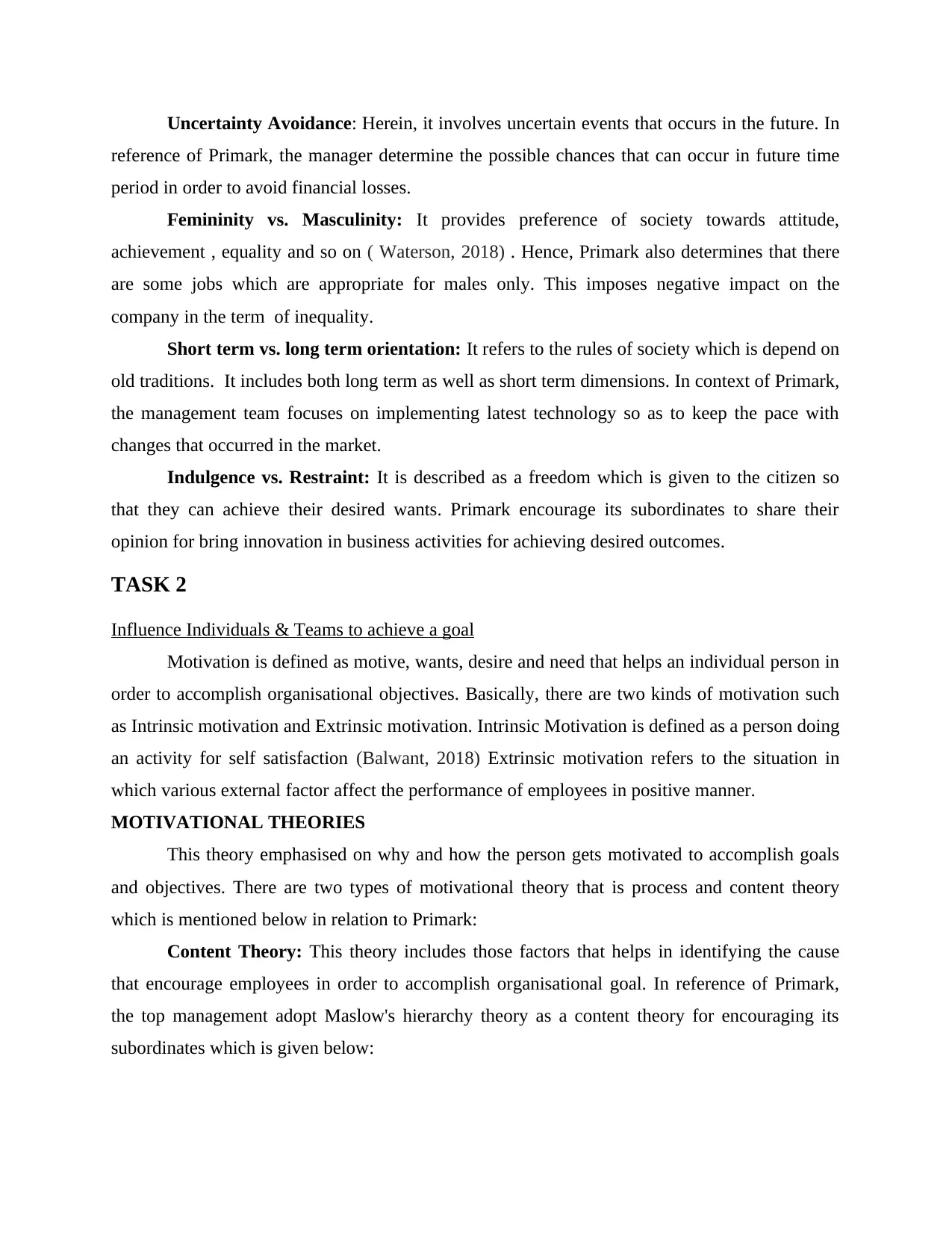
Uncertainty Avoidance: Herein, it involves uncertain events that occurs in the future. In
reference of Primark, the manager determine the possible chances that can occur in future time
period in order to avoid financial losses.
Femininity vs. Masculinity: It provides preference of society towards attitude,
achievement , equality and so on ( Waterson, 2018) . Hence, Primark also determines that there
are some jobs which are appropriate for males only. This imposes negative impact on the
company in the term of inequality.
Short term vs. long term orientation: It refers to the rules of society which is depend on
old traditions. It includes both long term as well as short term dimensions. In context of Primark,
the management team focuses on implementing latest technology so as to keep the pace with
changes that occurred in the market.
Indulgence vs. Restraint: It is described as a freedom which is given to the citizen so
that they can achieve their desired wants. Primark encourage its subordinates to share their
opinion for bring innovation in business activities for achieving desired outcomes.
TASK 2
Influence Individuals & Teams to achieve a goal
Motivation is defined as motive, wants, desire and need that helps an individual person in
order to accomplish organisational objectives. Basically, there are two kinds of motivation such
as Intrinsic motivation and Extrinsic motivation. Intrinsic Motivation is defined as a person doing
an activity for self satisfaction (Balwant, 2018) Extrinsic motivation refers to the situation in
which various external factor affect the performance of employees in positive manner.
MOTIVATIONAL THEORIES
This theory emphasised on why and how the person gets motivated to accomplish goals
and objectives. There are two types of motivational theory that is process and content theory
which is mentioned below in relation to Primark:
Content Theory: This theory includes those factors that helps in identifying the cause
that encourage employees in order to accomplish organisational goal. In reference of Primark,
the top management adopt Maslow's hierarchy theory as a content theory for encouraging its
subordinates which is given below:
reference of Primark, the manager determine the possible chances that can occur in future time
period in order to avoid financial losses.
Femininity vs. Masculinity: It provides preference of society towards attitude,
achievement , equality and so on ( Waterson, 2018) . Hence, Primark also determines that there
are some jobs which are appropriate for males only. This imposes negative impact on the
company in the term of inequality.
Short term vs. long term orientation: It refers to the rules of society which is depend on
old traditions. It includes both long term as well as short term dimensions. In context of Primark,
the management team focuses on implementing latest technology so as to keep the pace with
changes that occurred in the market.
Indulgence vs. Restraint: It is described as a freedom which is given to the citizen so
that they can achieve their desired wants. Primark encourage its subordinates to share their
opinion for bring innovation in business activities for achieving desired outcomes.
TASK 2
Influence Individuals & Teams to achieve a goal
Motivation is defined as motive, wants, desire and need that helps an individual person in
order to accomplish organisational objectives. Basically, there are two kinds of motivation such
as Intrinsic motivation and Extrinsic motivation. Intrinsic Motivation is defined as a person doing
an activity for self satisfaction (Balwant, 2018) Extrinsic motivation refers to the situation in
which various external factor affect the performance of employees in positive manner.
MOTIVATIONAL THEORIES
This theory emphasised on why and how the person gets motivated to accomplish goals
and objectives. There are two types of motivational theory that is process and content theory
which is mentioned below in relation to Primark:
Content Theory: This theory includes those factors that helps in identifying the cause
that encourage employees in order to accomplish organisational goal. In reference of Primark,
the top management adopt Maslow's hierarchy theory as a content theory for encouraging its
subordinates which is given below:
⊘ This is a preview!⊘
Do you want full access?
Subscribe today to unlock all pages.

Trusted by 1+ million students worldwide
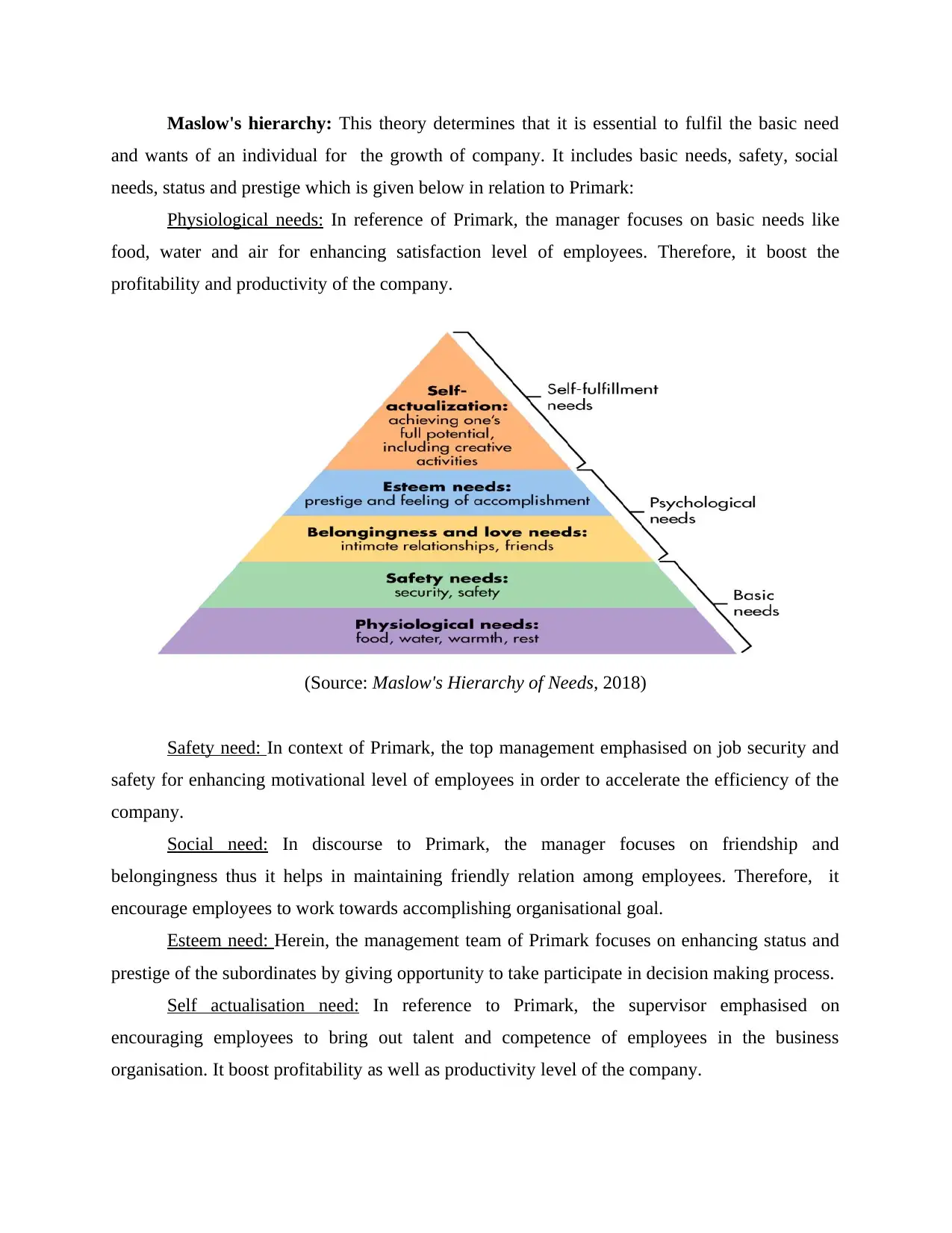
Maslow's hierarchy: This theory determines that it is essential to fulfil the basic need
and wants of an individual for the growth of company. It includes basic needs, safety, social
needs, status and prestige which is given below in relation to Primark:
Physiological needs: In reference of Primark, the manager focuses on basic needs like
food, water and air for enhancing satisfaction level of employees. Therefore, it boost the
profitability and productivity of the company.
(Source: Maslow's Hierarchy of Needs, 2018)
Safety need: In context of Primark, the top management emphasised on job security and
safety for enhancing motivational level of employees in order to accelerate the efficiency of the
company.
Social need: In discourse to Primark, the manager focuses on friendship and
belongingness thus it helps in maintaining friendly relation among employees. Therefore, it
encourage employees to work towards accomplishing organisational goal.
Esteem need: Herein, the management team of Primark focuses on enhancing status and
prestige of the subordinates by giving opportunity to take participate in decision making process.
Self actualisation need: In reference to Primark, the supervisor emphasised on
encouraging employees to bring out talent and competence of employees in the business
organisation. It boost profitability as well as productivity level of the company.
and wants of an individual for the growth of company. It includes basic needs, safety, social
needs, status and prestige which is given below in relation to Primark:
Physiological needs: In reference of Primark, the manager focuses on basic needs like
food, water and air for enhancing satisfaction level of employees. Therefore, it boost the
profitability and productivity of the company.
(Source: Maslow's Hierarchy of Needs, 2018)
Safety need: In context of Primark, the top management emphasised on job security and
safety for enhancing motivational level of employees in order to accelerate the efficiency of the
company.
Social need: In discourse to Primark, the manager focuses on friendship and
belongingness thus it helps in maintaining friendly relation among employees. Therefore, it
encourage employees to work towards accomplishing organisational goal.
Esteem need: Herein, the management team of Primark focuses on enhancing status and
prestige of the subordinates by giving opportunity to take participate in decision making process.
Self actualisation need: In reference to Primark, the supervisor emphasised on
encouraging employees to bring out talent and competence of employees in the business
organisation. It boost profitability as well as productivity level of the company.
Paraphrase This Document
Need a fresh take? Get an instant paraphrase of this document with our AI Paraphraser
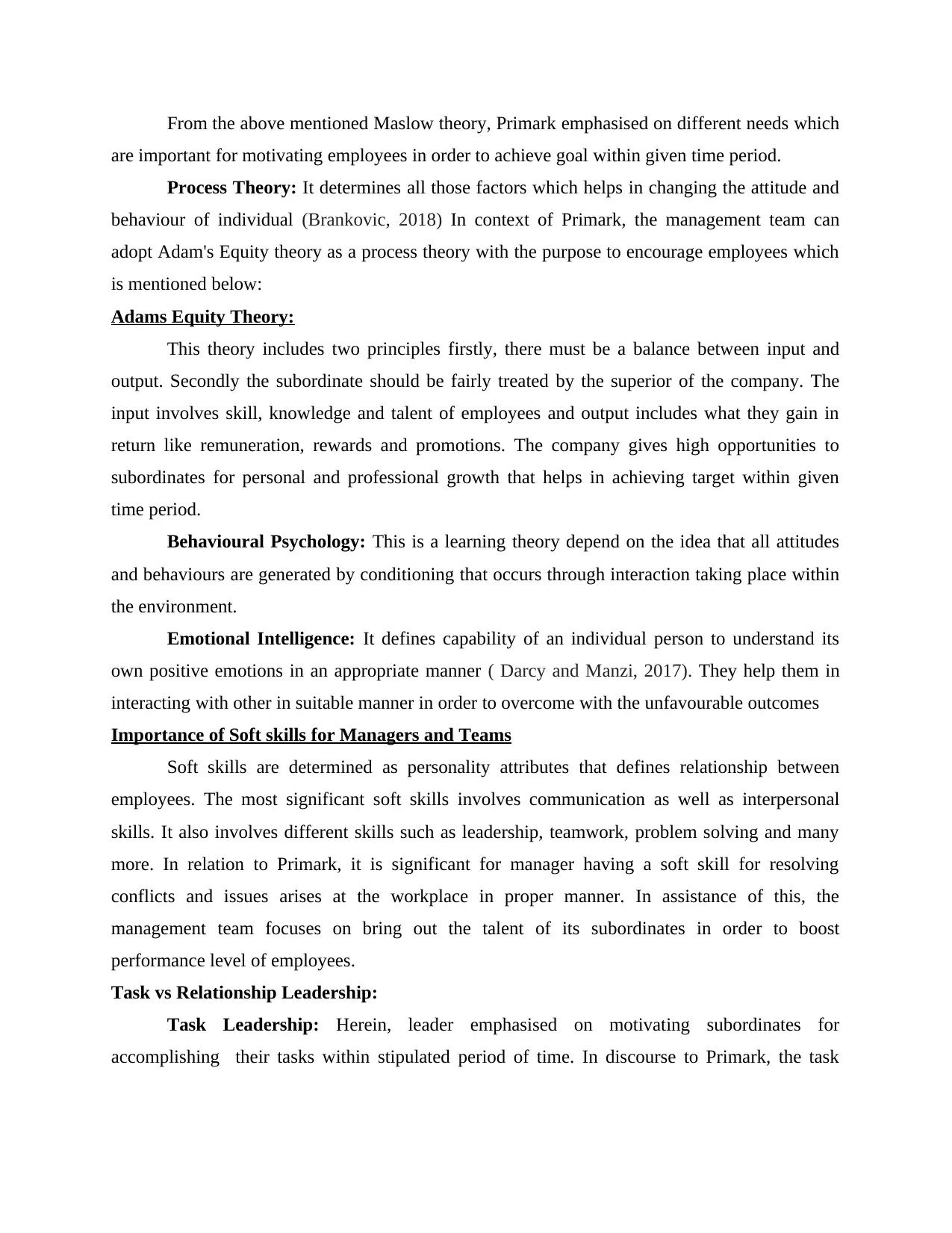
From the above mentioned Maslow theory, Primark emphasised on different needs which
are important for motivating employees in order to achieve goal within given time period.
Process Theory: It determines all those factors which helps in changing the attitude and
behaviour of individual (Brankovic, 2018) In context of Primark, the management team can
adopt Adam's Equity theory as a process theory with the purpose to encourage employees which
is mentioned below:
Adams Equity Theory:
This theory includes two principles firstly, there must be a balance between input and
output. Secondly the subordinate should be fairly treated by the superior of the company. The
input involves skill, knowledge and talent of employees and output includes what they gain in
return like remuneration, rewards and promotions. The company gives high opportunities to
subordinates for personal and professional growth that helps in achieving target within given
time period.
Behavioural Psychology: This is a learning theory depend on the idea that all attitudes
and behaviours are generated by conditioning that occurs through interaction taking place within
the environment.
Emotional Intelligence: It defines capability of an individual person to understand its
own positive emotions in an appropriate manner ( Darcy and Manzi, 2017). They help them in
interacting with other in suitable manner in order to overcome with the unfavourable outcomes
Importance of Soft skills for Managers and Teams
Soft skills are determined as personality attributes that defines relationship between
employees. The most significant soft skills involves communication as well as interpersonal
skills. It also involves different skills such as leadership, teamwork, problem solving and many
more. In relation to Primark, it is significant for manager having a soft skill for resolving
conflicts and issues arises at the workplace in proper manner. In assistance of this, the
management team focuses on bring out the talent of its subordinates in order to boost
performance level of employees.
Task vs Relationship Leadership:
Task Leadership: Herein, leader emphasised on motivating subordinates for
accomplishing their tasks within stipulated period of time. In discourse to Primark, the task
are important for motivating employees in order to achieve goal within given time period.
Process Theory: It determines all those factors which helps in changing the attitude and
behaviour of individual (Brankovic, 2018) In context of Primark, the management team can
adopt Adam's Equity theory as a process theory with the purpose to encourage employees which
is mentioned below:
Adams Equity Theory:
This theory includes two principles firstly, there must be a balance between input and
output. Secondly the subordinate should be fairly treated by the superior of the company. The
input involves skill, knowledge and talent of employees and output includes what they gain in
return like remuneration, rewards and promotions. The company gives high opportunities to
subordinates for personal and professional growth that helps in achieving target within given
time period.
Behavioural Psychology: This is a learning theory depend on the idea that all attitudes
and behaviours are generated by conditioning that occurs through interaction taking place within
the environment.
Emotional Intelligence: It defines capability of an individual person to understand its
own positive emotions in an appropriate manner ( Darcy and Manzi, 2017). They help them in
interacting with other in suitable manner in order to overcome with the unfavourable outcomes
Importance of Soft skills for Managers and Teams
Soft skills are determined as personality attributes that defines relationship between
employees. The most significant soft skills involves communication as well as interpersonal
skills. It also involves different skills such as leadership, teamwork, problem solving and many
more. In relation to Primark, it is significant for manager having a soft skill for resolving
conflicts and issues arises at the workplace in proper manner. In assistance of this, the
management team focuses on bring out the talent of its subordinates in order to boost
performance level of employees.
Task vs Relationship Leadership:
Task Leadership: Herein, leader emphasised on motivating subordinates for
accomplishing their tasks within stipulated period of time. In discourse to Primark, the task
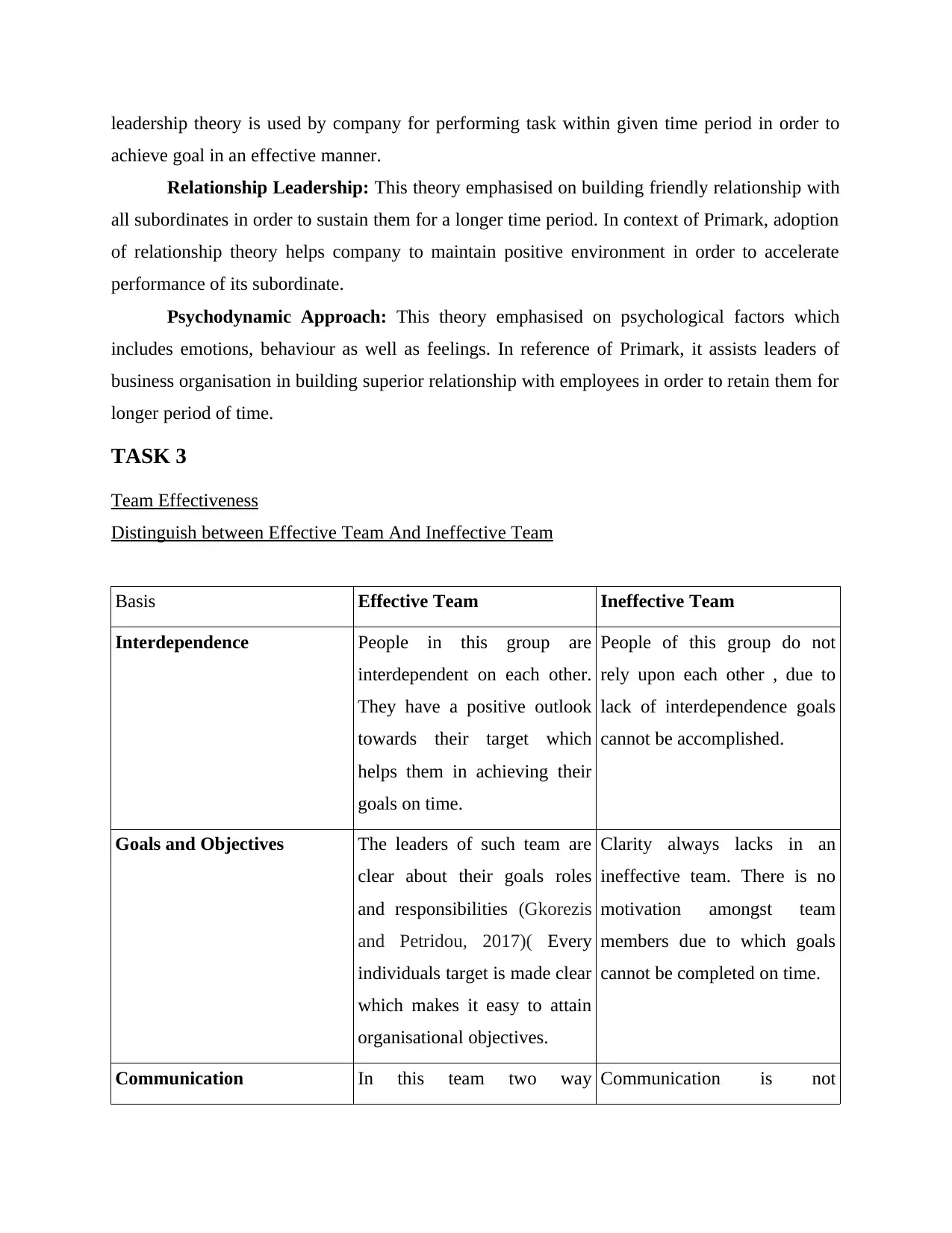
leadership theory is used by company for performing task within given time period in order to
achieve goal in an effective manner.
Relationship Leadership: This theory emphasised on building friendly relationship with
all subordinates in order to sustain them for a longer time period. In context of Primark, adoption
of relationship theory helps company to maintain positive environment in order to accelerate
performance of its subordinate.
Psychodynamic Approach: This theory emphasised on psychological factors which
includes emotions, behaviour as well as feelings. In reference of Primark, it assists leaders of
business organisation in building superior relationship with employees in order to retain them for
longer period of time.
TASK 3
Team Effectiveness
Distinguish between Effective Team And Ineffective Team
Basis Effective Team Ineffective Team
Interdependence People in this group are
interdependent on each other.
They have a positive outlook
towards their target which
helps them in achieving their
goals on time.
People of this group do not
rely upon each other , due to
lack of interdependence goals
cannot be accomplished.
Goals and Objectives The leaders of such team are
clear about their goals roles
and responsibilities (Gkorezis
and Petridou, 2017)( Every
individuals target is made clear
which makes it easy to attain
organisational objectives.
Clarity always lacks in an
ineffective team. There is no
motivation amongst team
members due to which goals
cannot be completed on time.
Communication In this team two way Communication is not
achieve goal in an effective manner.
Relationship Leadership: This theory emphasised on building friendly relationship with
all subordinates in order to sustain them for a longer time period. In context of Primark, adoption
of relationship theory helps company to maintain positive environment in order to accelerate
performance of its subordinate.
Psychodynamic Approach: This theory emphasised on psychological factors which
includes emotions, behaviour as well as feelings. In reference of Primark, it assists leaders of
business organisation in building superior relationship with employees in order to retain them for
longer period of time.
TASK 3
Team Effectiveness
Distinguish between Effective Team And Ineffective Team
Basis Effective Team Ineffective Team
Interdependence People in this group are
interdependent on each other.
They have a positive outlook
towards their target which
helps them in achieving their
goals on time.
People of this group do not
rely upon each other , due to
lack of interdependence goals
cannot be accomplished.
Goals and Objectives The leaders of such team are
clear about their goals roles
and responsibilities (Gkorezis
and Petridou, 2017)( Every
individuals target is made clear
which makes it easy to attain
organisational objectives.
Clarity always lacks in an
ineffective team. There is no
motivation amongst team
members due to which goals
cannot be completed on time.
Communication In this team two way Communication is not
⊘ This is a preview!⊘
Do you want full access?
Subscribe today to unlock all pages.

Trusted by 1+ million students worldwide
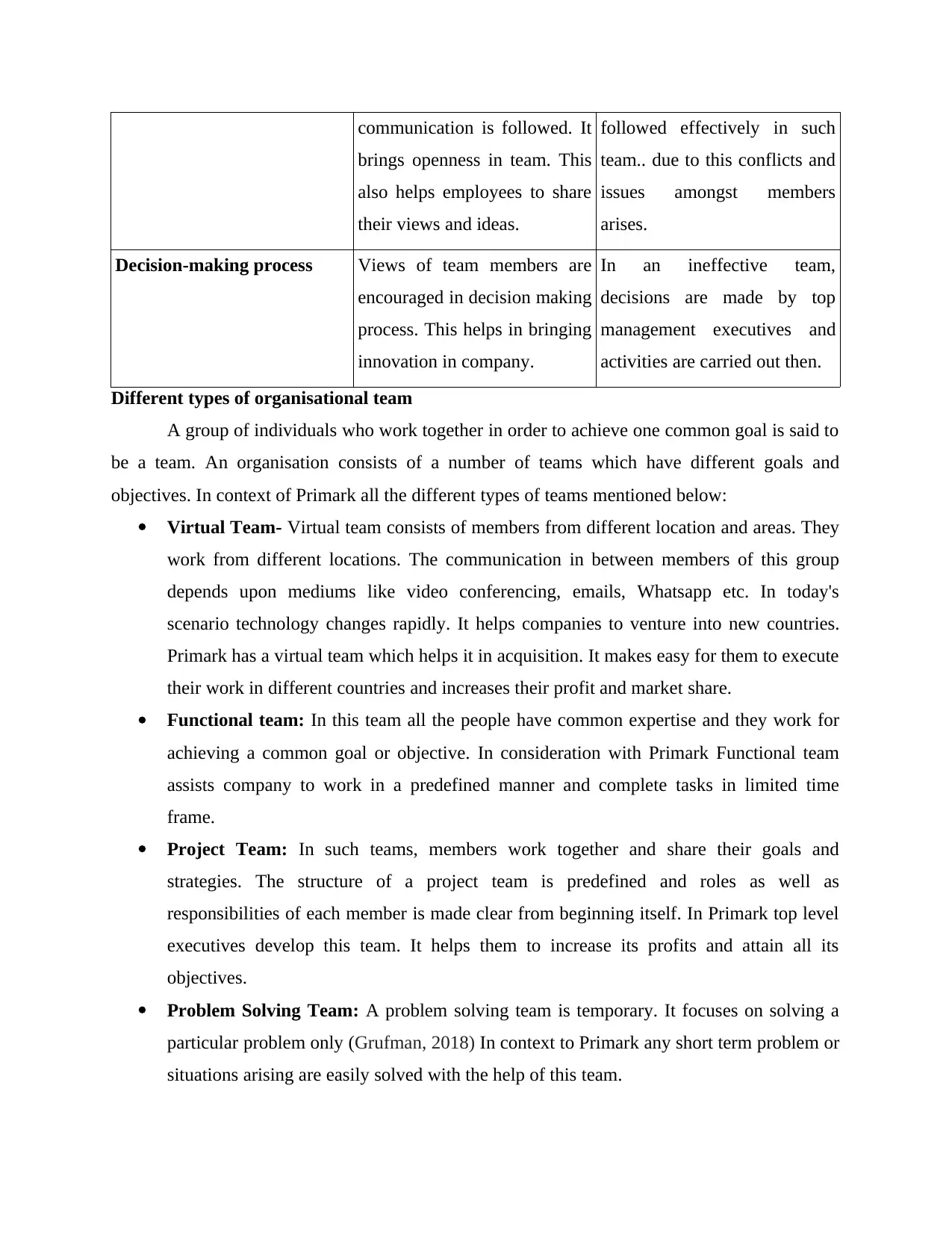
communication is followed. It
brings openness in team. This
also helps employees to share
their views and ideas.
followed effectively in such
team.. due to this conflicts and
issues amongst members
arises.
Decision-making process Views of team members are
encouraged in decision making
process. This helps in bringing
innovation in company.
In an ineffective team,
decisions are made by top
management executives and
activities are carried out then.
Different types of organisational team
A group of individuals who work together in order to achieve one common goal is said to
be a team. An organisation consists of a number of teams which have different goals and
objectives. In context of Primark all the different types of teams mentioned below:
Virtual Team- Virtual team consists of members from different location and areas. They
work from different locations. The communication in between members of this group
depends upon mediums like video conferencing, emails, Whatsapp etc. In today's
scenario technology changes rapidly. It helps companies to venture into new countries.
Primark has a virtual team which helps it in acquisition. It makes easy for them to execute
their work in different countries and increases their profit and market share.
Functional team: In this team all the people have common expertise and they work for
achieving a common goal or objective. In consideration with Primark Functional team
assists company to work in a predefined manner and complete tasks in limited time
frame.
Project Team: In such teams, members work together and share their goals and
strategies. The structure of a project team is predefined and roles as well as
responsibilities of each member is made clear from beginning itself. In Primark top level
executives develop this team. It helps them to increase its profits and attain all its
objectives.
Problem Solving Team: A problem solving team is temporary. It focuses on solving a
particular problem only (Grufman, 2018) In context to Primark any short term problem or
situations arising are easily solved with the help of this team.
brings openness in team. This
also helps employees to share
their views and ideas.
followed effectively in such
team.. due to this conflicts and
issues amongst members
arises.
Decision-making process Views of team members are
encouraged in decision making
process. This helps in bringing
innovation in company.
In an ineffective team,
decisions are made by top
management executives and
activities are carried out then.
Different types of organisational team
A group of individuals who work together in order to achieve one common goal is said to
be a team. An organisation consists of a number of teams which have different goals and
objectives. In context of Primark all the different types of teams mentioned below:
Virtual Team- Virtual team consists of members from different location and areas. They
work from different locations. The communication in between members of this group
depends upon mediums like video conferencing, emails, Whatsapp etc. In today's
scenario technology changes rapidly. It helps companies to venture into new countries.
Primark has a virtual team which helps it in acquisition. It makes easy for them to execute
their work in different countries and increases their profit and market share.
Functional team: In this team all the people have common expertise and they work for
achieving a common goal or objective. In consideration with Primark Functional team
assists company to work in a predefined manner and complete tasks in limited time
frame.
Project Team: In such teams, members work together and share their goals and
strategies. The structure of a project team is predefined and roles as well as
responsibilities of each member is made clear from beginning itself. In Primark top level
executives develop this team. It helps them to increase its profits and attain all its
objectives.
Problem Solving Team: A problem solving team is temporary. It focuses on solving a
particular problem only (Grufman, 2018) In context to Primark any short term problem or
situations arising are easily solved with the help of this team.
Paraphrase This Document
Need a fresh take? Get an instant paraphrase of this document with our AI Paraphraser
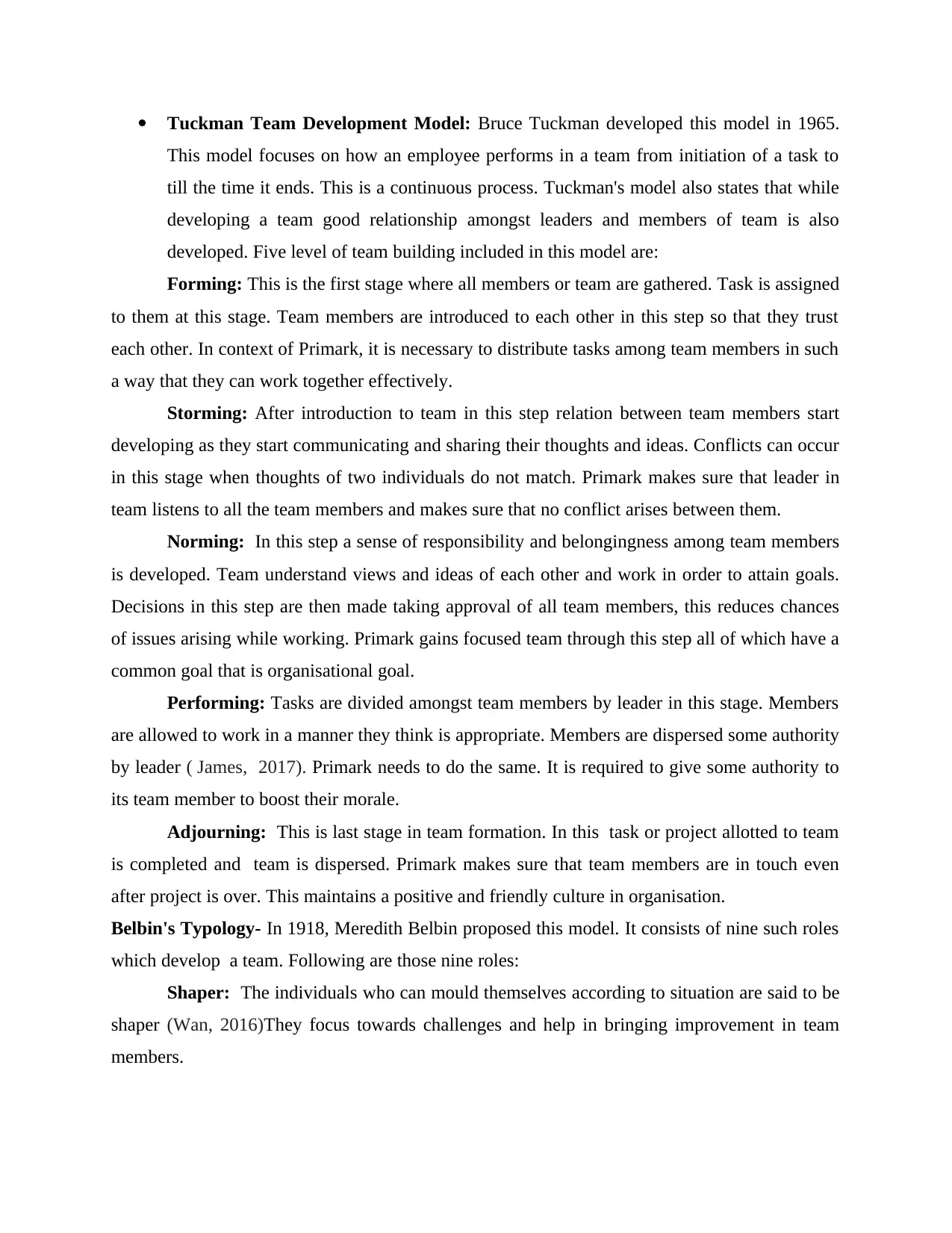
Tuckman Team Development Model: Bruce Tuckman developed this model in 1965.
This model focuses on how an employee performs in a team from initiation of a task to
till the time it ends. This is a continuous process. Tuckman's model also states that while
developing a team good relationship amongst leaders and members of team is also
developed. Five level of team building included in this model are:
Forming: This is the first stage where all members or team are gathered. Task is assigned
to them at this stage. Team members are introduced to each other in this step so that they trust
each other. In context of Primark, it is necessary to distribute tasks among team members in such
a way that they can work together effectively.
Storming: After introduction to team in this step relation between team members start
developing as they start communicating and sharing their thoughts and ideas. Conflicts can occur
in this stage when thoughts of two individuals do not match. Primark makes sure that leader in
team listens to all the team members and makes sure that no conflict arises between them.
Norming: In this step a sense of responsibility and belongingness among team members
is developed. Team understand views and ideas of each other and work in order to attain goals.
Decisions in this step are then made taking approval of all team members, this reduces chances
of issues arising while working. Primark gains focused team through this step all of which have a
common goal that is organisational goal.
Performing: Tasks are divided amongst team members by leader in this stage. Members
are allowed to work in a manner they think is appropriate. Members are dispersed some authority
by leader ( James, 2017). Primark needs to do the same. It is required to give some authority to
its team member to boost their morale.
Adjourning: This is last stage in team formation. In this task or project allotted to team
is completed and team is dispersed. Primark makes sure that team members are in touch even
after project is over. This maintains a positive and friendly culture in organisation.
Belbin's Typology- In 1918, Meredith Belbin proposed this model. It consists of nine such roles
which develop a team. Following are those nine roles:
Shaper: The individuals who can mould themselves according to situation are said to be
shaper (Wan, 2016)They focus towards challenges and help in bringing improvement in team
members.
This model focuses on how an employee performs in a team from initiation of a task to
till the time it ends. This is a continuous process. Tuckman's model also states that while
developing a team good relationship amongst leaders and members of team is also
developed. Five level of team building included in this model are:
Forming: This is the first stage where all members or team are gathered. Task is assigned
to them at this stage. Team members are introduced to each other in this step so that they trust
each other. In context of Primark, it is necessary to distribute tasks among team members in such
a way that they can work together effectively.
Storming: After introduction to team in this step relation between team members start
developing as they start communicating and sharing their thoughts and ideas. Conflicts can occur
in this stage when thoughts of two individuals do not match. Primark makes sure that leader in
team listens to all the team members and makes sure that no conflict arises between them.
Norming: In this step a sense of responsibility and belongingness among team members
is developed. Team understand views and ideas of each other and work in order to attain goals.
Decisions in this step are then made taking approval of all team members, this reduces chances
of issues arising while working. Primark gains focused team through this step all of which have a
common goal that is organisational goal.
Performing: Tasks are divided amongst team members by leader in this stage. Members
are allowed to work in a manner they think is appropriate. Members are dispersed some authority
by leader ( James, 2017). Primark needs to do the same. It is required to give some authority to
its team member to boost their morale.
Adjourning: This is last stage in team formation. In this task or project allotted to team
is completed and team is dispersed. Primark makes sure that team members are in touch even
after project is over. This maintains a positive and friendly culture in organisation.
Belbin's Typology- In 1918, Meredith Belbin proposed this model. It consists of nine such roles
which develop a team. Following are those nine roles:
Shaper: The individuals who can mould themselves according to situation are said to be
shaper (Wan, 2016)They focus towards challenges and help in bringing improvement in team
members.
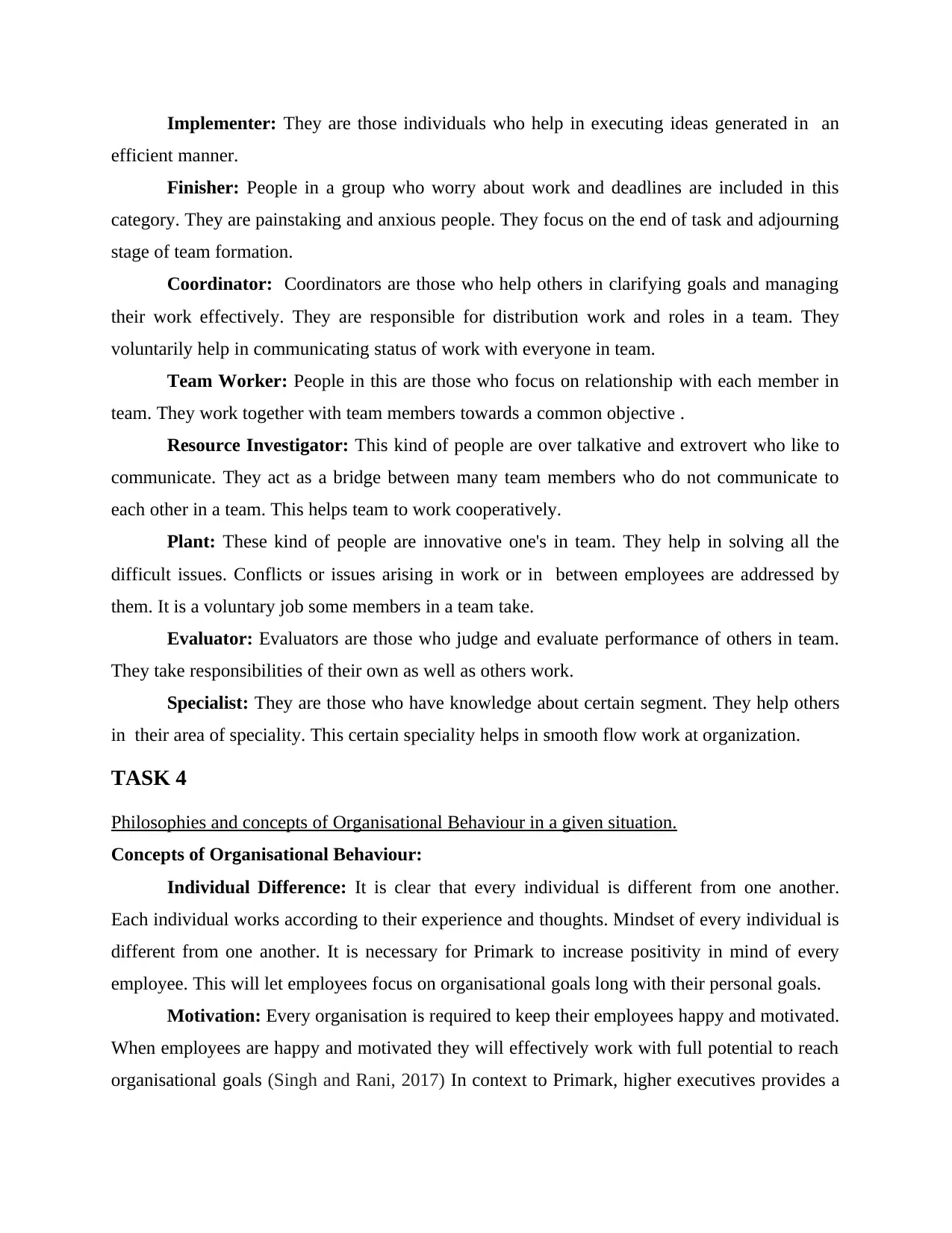
Implementer: They are those individuals who help in executing ideas generated in an
efficient manner.
Finisher: People in a group who worry about work and deadlines are included in this
category. They are painstaking and anxious people. They focus on the end of task and adjourning
stage of team formation.
Coordinator: Coordinators are those who help others in clarifying goals and managing
their work effectively. They are responsible for distribution work and roles in a team. They
voluntarily help in communicating status of work with everyone in team.
Team Worker: People in this are those who focus on relationship with each member in
team. They work together with team members towards a common objective .
Resource Investigator: This kind of people are over talkative and extrovert who like to
communicate. They act as a bridge between many team members who do not communicate to
each other in a team. This helps team to work cooperatively.
Plant: These kind of people are innovative one's in team. They help in solving all the
difficult issues. Conflicts or issues arising in work or in between employees are addressed by
them. It is a voluntary job some members in a team take.
Evaluator: Evaluators are those who judge and evaluate performance of others in team.
They take responsibilities of their own as well as others work.
Specialist: They are those who have knowledge about certain segment. They help others
in their area of speciality. This certain speciality helps in smooth flow work at organization.
TASK 4
Philosophies and concepts of Organisational Behaviour in a given situation.
Concepts of Organisational Behaviour:
Individual Difference: It is clear that every individual is different from one another.
Each individual works according to their experience and thoughts. Mindset of every individual is
different from one another. It is necessary for Primark to increase positivity in mind of every
employee. This will let employees focus on organisational goals long with their personal goals.
Motivation: Every organisation is required to keep their employees happy and motivated.
When employees are happy and motivated they will effectively work with full potential to reach
organisational goals (Singh and Rani, 2017) In context to Primark, higher executives provides a
efficient manner.
Finisher: People in a group who worry about work and deadlines are included in this
category. They are painstaking and anxious people. They focus on the end of task and adjourning
stage of team formation.
Coordinator: Coordinators are those who help others in clarifying goals and managing
their work effectively. They are responsible for distribution work and roles in a team. They
voluntarily help in communicating status of work with everyone in team.
Team Worker: People in this are those who focus on relationship with each member in
team. They work together with team members towards a common objective .
Resource Investigator: This kind of people are over talkative and extrovert who like to
communicate. They act as a bridge between many team members who do not communicate to
each other in a team. This helps team to work cooperatively.
Plant: These kind of people are innovative one's in team. They help in solving all the
difficult issues. Conflicts or issues arising in work or in between employees are addressed by
them. It is a voluntary job some members in a team take.
Evaluator: Evaluators are those who judge and evaluate performance of others in team.
They take responsibilities of their own as well as others work.
Specialist: They are those who have knowledge about certain segment. They help others
in their area of speciality. This certain speciality helps in smooth flow work at organization.
TASK 4
Philosophies and concepts of Organisational Behaviour in a given situation.
Concepts of Organisational Behaviour:
Individual Difference: It is clear that every individual is different from one another.
Each individual works according to their experience and thoughts. Mindset of every individual is
different from one another. It is necessary for Primark to increase positivity in mind of every
employee. This will let employees focus on organisational goals long with their personal goals.
Motivation: Every organisation is required to keep their employees happy and motivated.
When employees are happy and motivated they will effectively work with full potential to reach
organisational goals (Singh and Rani, 2017) In context to Primark, higher executives provides a
⊘ This is a preview!⊘
Do you want full access?
Subscribe today to unlock all pages.

Trusted by 1+ million students worldwide
1 out of 15
Related Documents
Your All-in-One AI-Powered Toolkit for Academic Success.
+13062052269
info@desklib.com
Available 24*7 on WhatsApp / Email
![[object Object]](/_next/static/media/star-bottom.7253800d.svg)
Unlock your academic potential
Copyright © 2020–2025 A2Z Services. All Rights Reserved. Developed and managed by ZUCOL.





